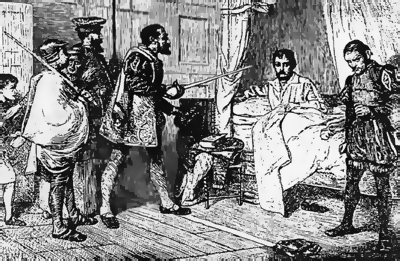 |
 |
|||
|
 Jocelyn
Palmer Jocelyn
PalmerReading's Protestant Martyr About 1555, Jocelyn Palmer was appointed master of the Free School at Reading. He was the son of a Coventry tradesman, and was educated at Magdalen College, Oxford, where he became noted for his skill in Latin and Greek learning. At this time, he was a keen supporter of the old Catholic order, then being attacked by King Henry VIII and the Protestant reformers. So zealous was he in support of the Catholic side that, during the reign of King Edward VI (1547-1553), when the Protestant reformers had the upper hand, he was expelled from his College. He then became a tutor in the house of Sir Francis Knollys Senior, at Greys Court near Reading, and soon afterwards he obtained the mastership of the Free School. While in the house of Sir Francis Knollys, Palmer seems to have been greatly moved by the heroic deaths of the Protestant martyrs under the persecutions of Queen Mary's government. It is said that he was an eyewitness of the burning of Bishops Ridley and Latimer in Oxford, and was so affected by their dreadful fate and their noble courage in enduring it, as to condemn loudly their persecutors. These feelings led him, at last, to change his religious opinions and, in the end, he came to feel that he could no longer defend the old Roman Catholic faith. Unfortunately for himself, he allowed others to know of this change in his opinions. The times were dangerous and religious strife was bitter. When it became known that the master of the Free School had become a heretic, or Protestant reformer, the feeling against him ran so high that he had to leave the town. He fled in haste, leaving his goods behind him, and with a quarter's salary still owing to him. He first went to see his mother and, by her, was severely reproached for changing his religious opinions. Then, he went to Oxford and, while there, he rashly resolved to come back to Reading in order to recover his property and the arrears of his salary. In Reading he lodged in an inn called the "Cardinal's Hat" in Minster Street. He wished no-one to know of his return to the town, but his enemies discovered him and, one night, Palmer was dragged out of his bed and thrown into a dungeon, where, it is said, he was cruelly treated. After an examination, before the Mayor of Reading, he was sent before the Queen's commissioners in Newbury, including John Winchcombe Junior. He was charged with being a heretic, or Protestant reformer, and there is no doubt that Palmer could no longer accept the teaching of the old faith. Many questions were put to him, but he refused to give up his opinions. He held fast to that which he believed to be true. The result was that he was condemned to die. Together with two others, he was burned at the stake at Newbury. He was only twenty-four years old. From WM Childs' "The Story of the Town of Reading" (1905) |
|||
| © Nash Ford Publishing 2003. All Rights Reserved. | ||||





